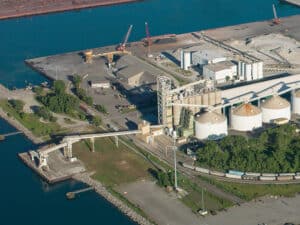![Tom Frazier aground and listing to starboard on Feb. 11, 2024. [Photo: U.S. Coast Guard]](https://www.marinelog.com/wp-content/uploads/2025/06/Towboataground-300x225.jpg)
NTSB reports on an expensive collision between two barge tows
Written by Nick Blenkey
The National Transportation Safety Board has issued its report on a January 9, 2023 Lower Mississippi River collision between two barge tows that caused the barges in both tows to break free. Several barges were damaged in the collision, and about 1,380 gallons of ethanol spilled into the waterway. Two minor injuries were reported. Damages to the barges were estimated at $1.36 million.
The incident occurred near Fort Adams, Miss, when the towing vessel Big D, operated by Florida Marine Transporters (FMT) was pushing 19 barges downbound on the Lower Mississippi River, and the towing vessel Carol McManus, owned and operated by Ingram Barge, was pushing 42 barges upbound on the river.
The NTSB says that the failure of the pilot of one the vessels to incorrectly recall the passing arrangement agreed by the two vessels led to the tows colliding
According to the Inland Navigation Rules, notes the NTSB, when two vessels are meeting or crossing, each vessel shall signal its maneuvering intentions by using the vessel’s whistle or VHF radio. About 20 minutes before the 19-barge Big D tow and 42-barge Carol McManus tow met at the bend near Fort Adams, the pilots navigating the tows agreed over VHF radio to a port-to-port passage.
The Big D pilot maneuvered his downbound tow toward the right descending bank. The Carol McManus pilot incorrectly recalled the arrangement, and also navigated his upbound tow toward the right descending bank. The pilots, noticing the danger of colliding, attempted to maneuver to avoid the collision, but there was insufficient time to do so before the tows collided.
“When one mariner proposes an arrangement to another, the other mariner should repeat back the proposed passing arrangement to ensure both parties have a shared understanding of the arrangement,” the report said. “Verbally repeating or ‘rehearsing’ a piece of information, such as a passing arrangement, serves two purposes: It ensures that both operators understand the arrangement, and it reinforces the storage and maintenance of passing arrangement information in each operator’s working memory until the information is required to be accurately recalled (when the vessels meet). Repeating back a proposed arrangement is critical when there is a long period of time between when passing arrangements are made and when the vessels meet.”
- Read the full NTSB report into the collision between the two barge tows HERE




